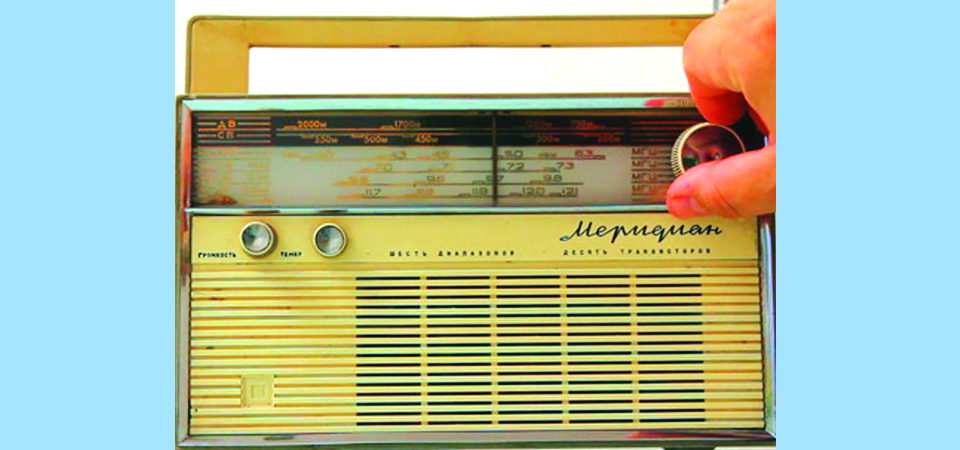An ode to radio to mark the World Radio Day

By Shaurya Kshatri
Kathmandu, Feb. 14: It was sometime around the mid-1940s when the world was reeling under the impact of the horrifying World War II that Satya Mohan Joshi finally bought his first radio set.
During the Great War, the Rana rulers had seized about 400 radios from Nepali owners and had stored them all in Sigha Durbar, as Sunil Ulak, historical photo collector, recounts in his social media commemoration post to mark the 10th World Radio Day. In his elaborate paper titled 'Seven Decades of Radio Listening in Nepal', Shekhar Parajulee also narrates the episode in great detail. The paper claims that Rana rulers had been supporting the British and thus did not want the people to know of its ally faring badly against the relentless Japanese soldiers.
In July 1946, the tides turned and people were free to own radios with then Prime Minister Padma Shamser Rana declaring that it was permissible to have personal radios. Seizing the opportunity, it was then that the Literary Centenarian Joshi finally got the long coveted and luxurious five banned Bush Radio. Joshi, at the time, was a dynamic young government official. Working at the Department of Statistics, the celebrated historian and scholar had to pay almost more than half of his yearly earnings for the radio. "I used to earn a little over Rs. 600 per year. The radio, which I bought from a certain Amatya ji from his shop in Khicha Pokhari, cost about Rs. 300," reminisced Joshi during a telephone conversation with The Rising Nepal. Rs. 300 for a radio might not raise eyebrows anymore but back then it was a fortune.
From costing an arm and a leg to being the most ubiquitous form of communication, radio has had a long and illustrious history in Nepal.
The World Radio Day
Nepal joined the rest of the world to mark the 10th edition of World Radio Day on Saturday under the theme “New World, New Radio.”
According to UNESCO’s release, this year’s theme recalls how this medium is part of humanity’s history by following various developments in our society and adapting its services.
Furthermore, the World Radio Day 2021 aims to highlight the significance of radio in three major sub-themes, namely, evolution, innovation, and connection. Bearing this in mind, the Antenna Foundation Nepal hosted a public online conference titled, ‘World Radio Day Special Discussion’. Present at the event was Communications and Information Technology Minister Parbat Gurung himself along with notable radio personalities and concerned stakeholders. The online discussions shed light on the current situation of radio while also presenting some of the challenges and opportunities. Speaking at the event, Chandra Neupane, President of Broadcasting Association of Nepal (BAN), said that Radio still continues to be a great messenger contrary to popular belief. “FM radios, community radios are the number one means to reach remote places, and the vulnerable population. Around 60 per cent of the information is relayed by radio alone,” he added.
Furthermore, a few of the radio personalities brought up the case of royalty fees being levied to the already suffering radio and media industry. As per the Telecommunication Rules, 2054 (1997), broadcasters should pay the royalty in an amount at a rate of four percent of the total income to the Government of Nepal. Addressing the issue, Minister Gurung urged the media persons to suggest improvements in writing for the government to take proper action.
“Radio has played a huge role in relaying important information over the decades. We are recently discussing plans and policies to ensure insurance for radio and other means to promote communication,” said Minister Gurung. During the pandemic, and the subsequent lockdown, the popularity of radio has grown further, claimed Suman Basnet, Regional Director of the World Association of Community Radio Broadcaster, AMARC (Asia-Pacific).
Turning the pages of history, radio has been playing an instrumental role, be it in major political changes, or responding to crises such as the pandemic.
In 1950, during its fight against the Rana autocracy, the Nepali Congress Party and freedom fighters had begun running radio transmissions called Prajatantra Nepal Radio from Biratnagar. When Nepali Congress' campaign succeeded, the new government shifted the radio programme to Kathmandu, which was later renamed Radio Nepal. Up until 1995 Radio Nepal was the only radio station before the frequency modulation (FM) entered Nepal. In 1997, Radio Sagarmatha became the first independent community radio in entire South Asia that further reinforced the importance of radio and paved the way for others to come,” said BAN President Chandra Neupane.
Recent News

Do not make expressions casting dout on election: EC
14 Apr, 2022
CM Bhatta says may New Year 2079 BS inspire positive thinking
14 Apr, 2022
Three new cases, 44 recoveries in 24 hours
14 Apr, 2022
689 climbers of 84 teams so far acquire permits for climbing various peaks this spring season
14 Apr, 2022
How the rising cost of living crisis is impacting Nepal
14 Apr, 2022
US military confirms an interstellar meteor collided with Earth
14 Apr, 2022
Valneva Covid vaccine approved for use in UK
14 Apr, 2022
Chair Prachanda highlights need of unity among Maoist, Communist forces
14 Apr, 2022
Ranbir Kapoor and Alia Bhatt: Bollywood toasts star couple on wedding
14 Apr, 2022
President Bhandari confers decorations (Photo Feature)
14 Apr, 2022










